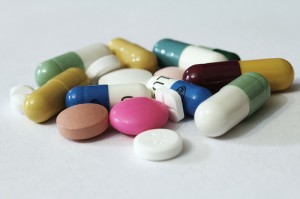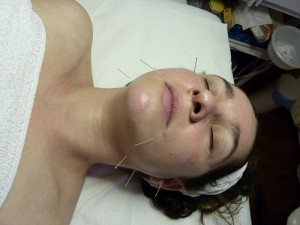When a patient known as Mr. Wright was diagnosed with terminal lymphoma (cancer of the lymphatic system), the doctors battling to prolong his life were ultimately left with  no option but to try a new ‘controversial’ anti-cancer drug – Krebiozen. Although doctors and scientists remained unconvinced about the drugs effectiveness, Mr Wright was confident that it would lead to an improvement of his condition. Despite being bed-bound and in extremely poor health, just three days after his first treatment he had enough energy to get out of bed. After ten days his tumours had shrunk significantly in size, and he was well enough to go home.
no option but to try a new ‘controversial’ anti-cancer drug – Krebiozen. Although doctors and scientists remained unconvinced about the drugs effectiveness, Mr Wright was confident that it would lead to an improvement of his condition. Despite being bed-bound and in extremely poor health, just three days after his first treatment he had enough energy to get out of bed. After ten days his tumours had shrunk significantly in size, and he was well enough to go home.
So what was this mysterious drug, and what caused the remission of his symptoms?
Krebiozen was marketed and endorsed in the 1950s by several physicians who claimed the drug possessed anti-cancer properties. One study claimed that of 22 patients with diagnosed terminal cancer, 14 remained alive after treatment. However, other scientists failed to reproduce these results and ultimately decided that the drug was of no benefit to cancer sufferers. The National Institute of Cancer verified this decision after finding that the drug consisted of nothing more than simple amino acids and mineral oil, with no active ingredients.
This drug was actually a placebo! Placebo treatments are usually given to patients in the form of sugar pills, but can also include injections and sham surgery. The key to the placebo’s success is ensuring the patient believes the treatment will improve their condition. Belief in the treatment can lead to a perceived or actual improvement of the condition.
 The so-called ‘placebo effect’ appears, at first glance, to make no sense whatsoever. How could a simple sugar pill alleviate serious medical symptoms? The answer may be as simple as a positive mental attitude. A patient’s mental well-being and perception of of their illness may be an important factor in influencing their medical prognosis. This is a remarkable concept, but how is it biologically possible? One suggestion is that the notion of medical intervention creates a mental cue which acts to kick-start an immune response within our bodies leading to self-healing. A similar response to seemingly unrelated external cues has in fact also been observed in Siberian Hamsters. When exposed to light levels which mimic winter days, hamsters show a depression of their immune response. If, however, they are exposed to lights mimicking summer days, the immune response increases and healing begins.
The so-called ‘placebo effect’ appears, at first glance, to make no sense whatsoever. How could a simple sugar pill alleviate serious medical symptoms? The answer may be as simple as a positive mental attitude. A patient’s mental well-being and perception of of their illness may be an important factor in influencing their medical prognosis. This is a remarkable concept, but how is it biologically possible? One suggestion is that the notion of medical intervention creates a mental cue which acts to kick-start an immune response within our bodies leading to self-healing. A similar response to seemingly unrelated external cues has in fact also been observed in Siberian Hamsters. When exposed to light levels which mimic winter days, hamsters show a depression of their immune response. If, however, they are exposed to lights mimicking summer days, the immune response increases and healing begins.
 I was first inspired to write this article by a programme I watched a few weeks ago on Channel 4 titled Derren Brown: Fear and Faith. This show demonstrated the power of the placebo effect through a fake clinical trial. Subjects on this trial were given a placebo drug (Rumyodin) and were told that it could inhibit feelings of fear. Over the course of few weeks, we saw each of the subjects overcome their respective fears ranging from heights and confrontation to singing in public. The drug was also effective as a cure for smoking and allergies. The strength of the placebo was enhanced by the very convincing story behind the drug’s development, including a fictitious pharmaceutical company and the use of doctors to administer the drug. The placebo’s extremely powerful effects were probably due to this attention to detail, meaning subjects were convinced that the treatment would work.
I was first inspired to write this article by a programme I watched a few weeks ago on Channel 4 titled Derren Brown: Fear and Faith. This show demonstrated the power of the placebo effect through a fake clinical trial. Subjects on this trial were given a placebo drug (Rumyodin) and were told that it could inhibit feelings of fear. Over the course of few weeks, we saw each of the subjects overcome their respective fears ranging from heights and confrontation to singing in public. The drug was also effective as a cure for smoking and allergies. The strength of the placebo was enhanced by the very convincing story behind the drug’s development, including a fictitious pharmaceutical company and the use of doctors to administer the drug. The placebo’s extremely powerful effects were probably due to this attention to detail, meaning subjects were convinced that the treatment would work.
So if placebos can offer such amazing results without the need for any active ingredient and all the side effects these may bring, why are they not used more regularly?
The ability of a placebo to alleviate symptoms is variable both in how often they succeed and the strength of the resulting symptom alleviation. Placebos appear to be more effective when symptoms are subjective such as pain or nausea and less effective for non-subjective symptoms such as abnormal blood pressure or heart rate.
 A recent study in the US has suggested that genes may also play an important role in deciding whether or not an individual responds to a placebo. Preliminary results indicate that if a particular gene is present, individuals with irritable bowel syndrome are more likely to respond to placebo acupuncture. Whether this effect may be replicated for other conditions is unclear. However, these results do offer an explanation as to why some people are more susceptible to the placebo effect than others.
A recent study in the US has suggested that genes may also play an important role in deciding whether or not an individual responds to a placebo. Preliminary results indicate that if a particular gene is present, individuals with irritable bowel syndrome are more likely to respond to placebo acupuncture. Whether this effect may be replicated for other conditions is unclear. However, these results do offer an explanation as to why some people are more susceptible to the placebo effect than others.
A study from 1985 hypothesised that the placebo effect relies heavily upon a belief that the medicine will make you feel better. Indeed, one study showed that the attitude of the prescribing doctor towards both the drug and the patient significantly altered the patients prognosis. In this study patient’s responses to a placebo rose from 44% to 62% when the doctor prescribing the treatment made a conscious effort to be positive.
This means that scientists are faced with a paradox when it comes to the use of placebos. Although there are clear ethical issues arising from their use, such as the controversy of introducing dishonesty into the patient-doctor relationship, ethical issues also arise from NOT using placebos. Is it unethical not to use something that could help improve a patient’s health? Despite this, the UK Parliamentary Committee for Science and Technology think that the placebo effect is unreliable and should not be used as a sole treatment on the NHS. In contrast, a study of GPs in Denmark has shown that 48% had previously prescribed placebo as treatments at least 10 times over the last year. Moreover, a study in 2004 uncovered that approximately 60% of physicians in Israel has used placebos in their practice.
What is important to remember, is that placebos are not a ‘one-size-fits-all’ cure that works for everyone. The effect that placebos have can be highly variable and often unreliable. Whilst some people respond positively to treatment with placebos, others experience no change to their condition. This positive effect appears to depend not only on the type of ailment the patient is suffering with, but also their mental attitude towards the treatment. However, what is clear is that a lot more research needs to be carried out to investigate exactly how and why placebos work, and why their success is so variable.
[youtube http://www.youtube.com/watch?v=wsFTgirKXHk&w=560&h=315]
Post by: Sam Lawrence
“What is important to remember, is that placebos are not a ‘one-size-fits-all’ cure that works for everyone. The effect that placebos have can be highly variable and often unreliable. Whilst some people respond positively to treatment with placebos, others experience no change to their condition. ”
The same can be said of any individual medicine and yet we prescribe them almost indiscriminately.
Great. I was particularly pleased to see the ethical question of not trying a placebo raised – at least you are taking it a bit seriously. Isn’t the placebo effect interesting? We do know that a lot of things can stimulate the immune system – though this itself has given rise to many bogus claims. It sounds like a testable hypothesis. Is there anyone testing it? Does the immune system suddenly shrink a tumour because of a positive mental attitude? Ethics questions aside, it should be testable shouldn’t it? Though how you would isolate the various factors in spontaneous remission and recovery from cancer I’m not sure, I’ve no doubt scientists will find a way if they bother to look. Not much money in it for the drug companies though eh?
I think Derren Brown’s experiments detracted from the main point here. The curing of purely psychological effects, by a well known hypnotist, is much less interesting. If I was conducting a study I wouldn’t let Brown within 100 miles and a triple blind of the participants. I’ve watched a lot of his shows and he can do amazing things, but he’s a wild card.
This is one in a small series of articles that have come out in the last 5-10 years which acknowledge physical alleviation of symptoms and sometimes cures for illness based on the patient’s belief that they have been given an effective treatment. It’s start, but I still see a lot of dismissal of such things as “merely placebo effect” as though it is inconsequential. Shrinking tumours are hardly inconsequential. Nor are many of the other effects that are now documented to quite a high standard of evidence gathering.
I’d like to recommend a book by an anthropologist. “The End of Magic” by Ariel Glucklich. He studied tantric healers in modern day Varanasi, and came up with an interesting take on how they work to help with illness. It’s not medical science, but it might help to provide clues into the kinds mental changes that need to take place for a placebo to be effective.
Surely the point here is that the key factor is a positive optimistic attitude, whether the “placebo” is a pill, a self help book, a religious belief, humour, a supportive partner, a pet, etc.. If I’m not mistaken, all these things have been shown to have healing benefits, so let’s not talk about pulling the wool over people’s eyes, but be open and make people aware how important one’s own attitude is and find ways to give people the support needed to keep positive.
Placebo Effect = Hypnosis
Make the substitution anywhere you like, and all will become clear.